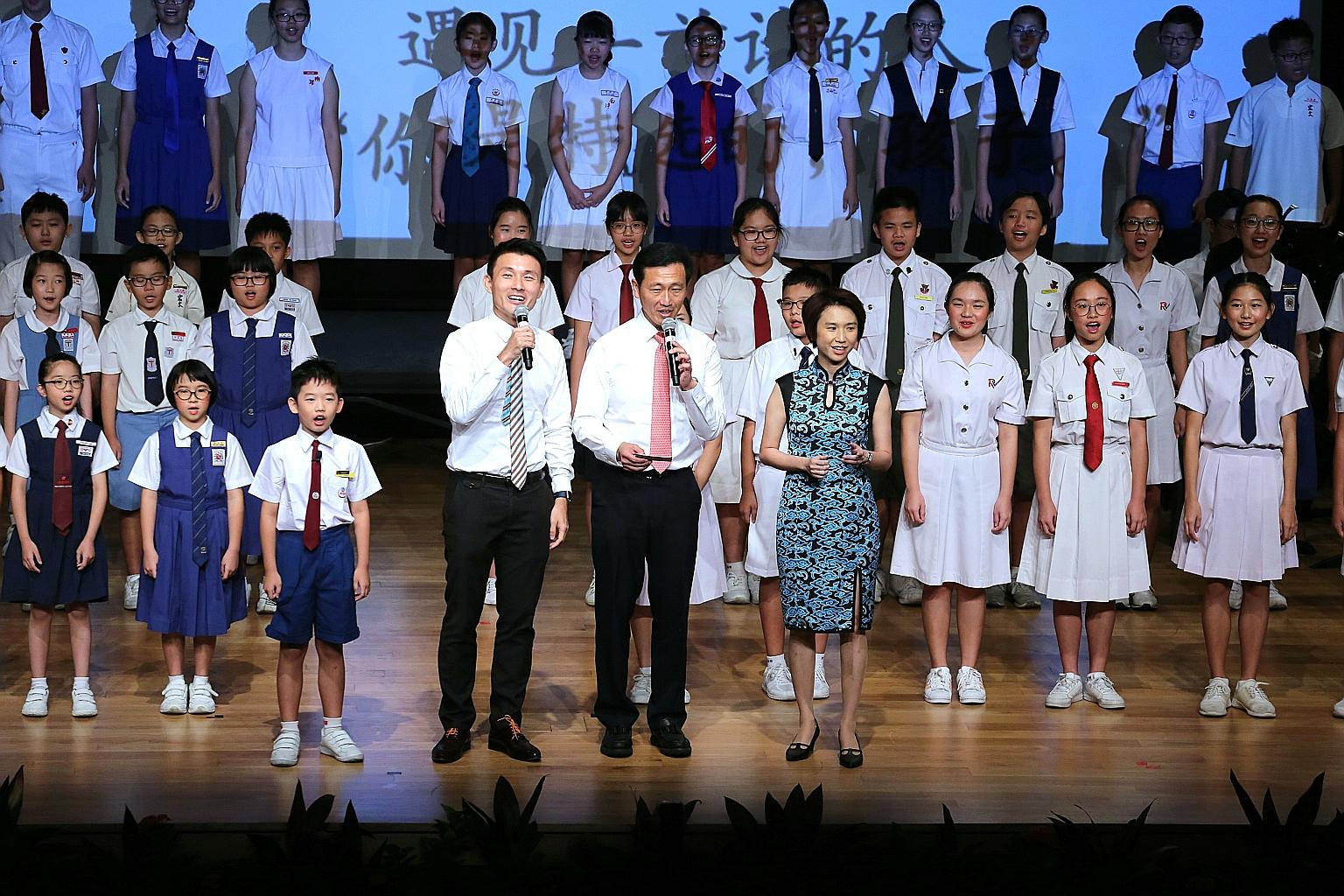SAP schools still have important role, 40 years on: Ong Ye Kung
Sign up now: Get ST's newsletters delivered to your inbox

Mr Ong Ye Kung (centre) reciting a Chinese poem with Mr Baey Yam Keng and Ms Low Yen Ling at the launch of a book commemorating the 40th anniversary of SAP schools yesterday.
PHOTO: LIANHE ZAOBAO
Forty years after being set up, Special Assistance Plan (SAP) schools still have a role in Singapore, to help ensure that each student cohort has a core group with an intuitive understanding of Chinese culture and history, with language skills close to those in China, Taiwan or Hong Kong.
And while this is important in the context of a fast-growing China, which is Singapore's largest trading partner, Education Minister Ong Ye Kung said that Malay and Tamil learning should be enhanced as well, with Indonesia, Malaysia and India also offering tremendous opportunities.
"Indeed, our programmes should seek to endow students with a deeper and more sophisticated understanding of our region, cultural heritage and languages. That is what will give us a distinct and lasting identity, competitiveness, capability and confidence as a people," he said yesterday at the launch of a book marking the 40th anniversary of SAP schools.
"Take, for example, the Chinese, Malay and Tamil Language Elective Programmes at the post-secondary level. Schools such as Nanyang Junior College have run them well and made them its distinctive offering. We should review the programmes with a view to enhancing and improving them, across all our mother tongues."
SAP schools, established in 1979 during a period when enrolment for Chinese-medium schools fell, were set up to preserve the traditional Chinese school cultural environment. But things have changed since then, Mr Ong said.
Not only is the use of English even more common today, many young Singaporeans are less conscious of their ethnic identity, and there are also more specialised programmes to promote mother tongue learning such as the Language Elective Programmes for Chinese, Malay and Tamil.
"These developments have led some to question the relevance of SAP schools," he said. But he cautioned against making "a drastic change to the SAP school system".
"The right thing to do is to preserve the programmes and institutions that promote the learning of our mother tongues and improve them where we can. We should be very careful not to undo any of these efforts, as that would be bucking the strategic trend at a time when it matters most."
He pointed out how Asia is now the world's fastest-growing region, and many other countries are stepping up the learning of multiple languages. "Today, it is common to meet PRC Chinese, Japanese or Koreans who speak fluent English, as it is common to meet Europeans, Americans or Australians who speak some Chinese. Bilingualism has been a unique advantage Singaporeans have, but other countries are catching up, even surpassing us," he said at the book launch at the Singapore Chinese Cultural Centre.
He also explained that SAP schools are a result of a balancing act which gives space for each community to achieve peaceful co-existence. "This is the case because we did not choose the path of ideological extremes - insisting that everyone is Singaporean and nothing else, or allowing every community to fully assert their cultural identities, leaving no common space for a Singaporean identity to grow in our young nation."
But he also said that more must be done to ensure that the students from SAP schools make friends from other communities.
"In my dialogue with SAP school principals, they appreciated and supported this and, indeed, identified this as one of the major tasks for SAP schools. Today, SAP schools have good initiatives to promote inter-cultural learning. For example, Hong Wen School (a SAP school), Alexandra Primary and Radin Mas Primary jointly conduct art programmes and celebrate Racial Harmony Day together. Nanyang Girls works with Madrasah Aljunied to jointly organise activities during festive seasons and national events.
"There is definitely room to do better. Because the objective is not just getting students to interact occasionally with students of other races, but also having the experience of growing up together with friends from all ethnic backgrounds, developing mutual trust, understanding our multi-cultural society and appreciating the adjustments that we have to make in order to maintain our social harmony and social cohesion."
Besides the commemorative book, a roving exhibition featuring the unique characteristics and contributions of SAP schools was launched yesterday as well. It will be staged in different SAP schools from next month to September.


